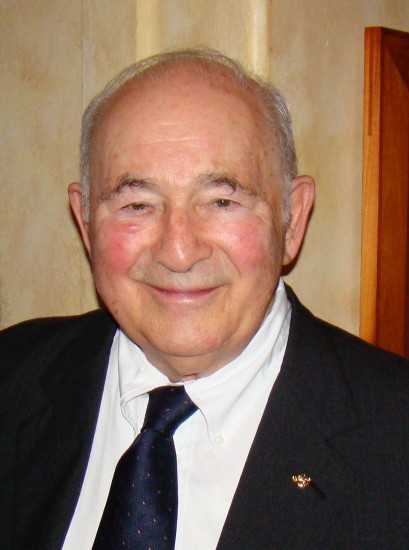Industry Legend Jack Glabman Dies at 97, Combined Two Passions: Textiles and Aviation
May 11, 2020

Jack Glabman
WASHINGTON – Furniture fabric veteran Jack Glabman died May 3, 2020.
He was 97.
Born in Chicago, he was an avid lover of aviation, and earned his pilot’s license before he had his driver’s license.
He graduated from the University of Chicago with an MBA and enlisted in Officers Training School in 1942. A naval fighter pilot during WW II, he served in Europe, including the Normandy Invasion, and the Asiatic Theatre Pacific, being awarded various medals. He was honorably discharged 1945.
His training and experience as a naval fighter pilot influenced his entire career path and created a love for flying.
After coming home from the war, Glabman left his family business and started his own lumber business in Wisconsin. He later entered his lifelong career in furniture fabrics, beginning with Goodall Vinyl.
Learning from an array of early industry greats and working with various companies, he met the Chatham Family and proposed and founded an upholstery division. He built their nascent furniture upholstery business into the largest division of Chatham Fabrics, even outpacing their blanket business.
He pioneered a durability story by developing nylon-fiber-based yarns with Dupont and capitalizing on Chatham’s yarn dye and piece dye capabilities.
He kept a keen conceptual eye with all yarn and finishing suppliers, culminating in working directly with 3M on their new Scotchgard-branded stain-protection finish. He signed a five-year exclusive contract with 3M, thereby transforming the entire Chatham line to be offered with Scotchgard on all items and featuring a heavy-duty nylon fiber.
This created a diversifying boon for his National Jobber Programs and furniture fabric categories.
Next after working with Office Furniture Manufacturers in Grand Rapids, Michigan, he created some of the very first office panel fabrics along with heavy-duty seating fabrics.
He was a member of a U.S. trade mission to Scandinavia to promote more trade internationally of U.S. textiles.
Throughout his career, he purchased various private airplanes and was able to incorporate his love for flying as a sales tool with his various customers: from Cessna twin engines, to a Beechcraft Turbo Commander, to finally owning his own Lear jet.
He would pick up customers, such as La-Z-Boy, Kroelher, and Steel Case, and fly them to the mill for showings of new products, and then home again.
In 1983, he proposed an upholstery segment to fabric powerhouse Burlington Industries. Along with developing lines of jacquard damasks, tapestries, and tufted velvets, he positioned Burlington as a major supplier.
Next, he was the founder and CEO of Print Plant Inc. in Winston-Salem, N.C., with a line he created called Charleston House. It was state of the art with Austrian Zimmer continuous and flatbed printing and finishing equipment.
Later, he met flock machinery innovator, Microfibres, and proposed that they join forces to produce prints and fiber-dyed plain fabrics. The print plant was purchased by Microfibres, and the joint effort produced an era of national and international success and distribution with many innovations: from fiber size, resist printing, and air-textured base cloths.
Years later, he teamed up with Blumenthal Mills in South Carolina and started a jacquard line. Adding to the array, he developed a dobby textured line with Southern Phoenix.
Over a span of a lifetime, he strategically positioned mills in the home furnishings fabrics industry, while helping so many people in the business to achieve success.
He spent his life buying new airplanes and also developed Triad Helicopters, a business with a fleet of helicopters leased to the Department of Power in North Carolina, police departments, and local news stations.
He flew regularly to feed his passion, and when he couldn’t, he would go down to the Pensacola Naval Air Station to keep himself jet certified in their simulators. There the current flyboy fighters would affectionately call him, grandpa, and they would take him up for a flight in the latest jet fighters.
He is survived by his sons, Scott, and Thom Glabman.
Throughout his lifetime and amidst all the action, Glabman was a devoted husband to Natalie, and a family man to his four children. He supported all his children’s endeavors and interests and helped so many in the industry to achieve success.
He was 97.
Born in Chicago, he was an avid lover of aviation, and earned his pilot’s license before he had his driver’s license.
He graduated from the University of Chicago with an MBA and enlisted in Officers Training School in 1942. A naval fighter pilot during WW II, he served in Europe, including the Normandy Invasion, and the Asiatic Theatre Pacific, being awarded various medals. He was honorably discharged 1945.
His training and experience as a naval fighter pilot influenced his entire career path and created a love for flying.
After coming home from the war, Glabman left his family business and started his own lumber business in Wisconsin. He later entered his lifelong career in furniture fabrics, beginning with Goodall Vinyl.
Learning from an array of early industry greats and working with various companies, he met the Chatham Family and proposed and founded an upholstery division. He built their nascent furniture upholstery business into the largest division of Chatham Fabrics, even outpacing their blanket business.
He pioneered a durability story by developing nylon-fiber-based yarns with Dupont and capitalizing on Chatham’s yarn dye and piece dye capabilities.
He kept a keen conceptual eye with all yarn and finishing suppliers, culminating in working directly with 3M on their new Scotchgard-branded stain-protection finish. He signed a five-year exclusive contract with 3M, thereby transforming the entire Chatham line to be offered with Scotchgard on all items and featuring a heavy-duty nylon fiber.
This created a diversifying boon for his National Jobber Programs and furniture fabric categories.
Next after working with Office Furniture Manufacturers in Grand Rapids, Michigan, he created some of the very first office panel fabrics along with heavy-duty seating fabrics.
He was a member of a U.S. trade mission to Scandinavia to promote more trade internationally of U.S. textiles.
Throughout his career, he purchased various private airplanes and was able to incorporate his love for flying as a sales tool with his various customers: from Cessna twin engines, to a Beechcraft Turbo Commander, to finally owning his own Lear jet.
He would pick up customers, such as La-Z-Boy, Kroelher, and Steel Case, and fly them to the mill for showings of new products, and then home again.
In 1983, he proposed an upholstery segment to fabric powerhouse Burlington Industries. Along with developing lines of jacquard damasks, tapestries, and tufted velvets, he positioned Burlington as a major supplier.
Next, he was the founder and CEO of Print Plant Inc. in Winston-Salem, N.C., with a line he created called Charleston House. It was state of the art with Austrian Zimmer continuous and flatbed printing and finishing equipment.
Later, he met flock machinery innovator, Microfibres, and proposed that they join forces to produce prints and fiber-dyed plain fabrics. The print plant was purchased by Microfibres, and the joint effort produced an era of national and international success and distribution with many innovations: from fiber size, resist printing, and air-textured base cloths.
Years later, he teamed up with Blumenthal Mills in South Carolina and started a jacquard line. Adding to the array, he developed a dobby textured line with Southern Phoenix.
Over a span of a lifetime, he strategically positioned mills in the home furnishings fabrics industry, while helping so many people in the business to achieve success.
He spent his life buying new airplanes and also developed Triad Helicopters, a business with a fleet of helicopters leased to the Department of Power in North Carolina, police departments, and local news stations.
He flew regularly to feed his passion, and when he couldn’t, he would go down to the Pensacola Naval Air Station to keep himself jet certified in their simulators. There the current flyboy fighters would affectionately call him, grandpa, and they would take him up for a flight in the latest jet fighters.
He is survived by his sons, Scott, and Thom Glabman.
Throughout his lifetime and amidst all the action, Glabman was a devoted husband to Natalie, and a family man to his four children. He supported all his children’s endeavors and interests and helped so many in the industry to achieve success.
















